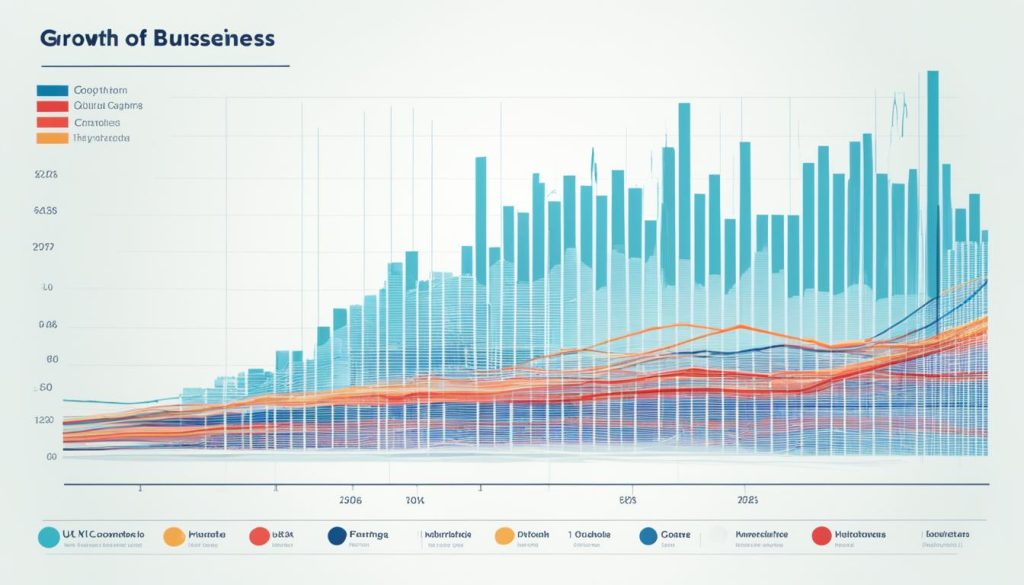Understanding UK’s business culture is key for success in its vibrant market. London’s cultural research agency, NERDS, highlights this through their portal, FRONTLINE. They stress the need for cultural focus and fresh ways to understand consumer actions and beliefs. Today, businesses strive for brand significance, moving from old loyalty schemes to cultural connections.
Ricoh UK and similar companies see the value in diversity data and feelings of inclusion. This shows how knowing the culture of consumers and workers is vital for business growth. By respecting cultural differences and using these insights, businesses can truly connect with UK customers.
Key Takeaways
- NERDS uses FRONTLINE for deep consumer-focused cultural knowledge.
- Cultural focus is vital for grasping consumer behaviour in the UK.
- There’s a shift from old loyalty programmes to cultural relevance.
- Ricoh UK sees diversity data as key to including everyone.
- Cultural insights are crucial for business strategy and lasting customer relationships.
Introduction to UK Business Statistics

Learning about the UK business scene is key for any company that wants to do well. By looking at both numbers and detailed stories from UK companies, you can get a full picture of the economy. This information helps businesses to update their plans to match new consumer likes and tech changes.
Companies that get into the culture of the UK tend to do well. They use these cultural insights to see where the market stands and where it may go. By mixing this understanding with company data, strategies can become more focused. This helps to stay relevant and win customer loyalty for a long time.
Also, knowing the economic signals of the UK helps companies spot chances and risks. This knowledge is key to plan for growth and adjust to changes in the market. With the UK market becoming more complex, it’s critical to keep up with trustworthy business stats.
- Enhance marketing strategies through detailed business statistics.
- Adapt to consumer trends by integrating cultural insights.i
- Utilise reliable UK business landscape data for forecasting and planning.
Economic Contribution of UK Businesses

UK businesses greatly boost the country’s economy. They are key in making the UK financially strong and dynamic. Each sector’s input to the UK’s GDP highlights their economic impact.
GDP Contribution
The UK GDP by industry shows the varied contributions of different areas. Sectors like manufacturing, finance, healthcare, and technology all add unique value. Financial services, for instance, greatly influence the UK’s economic scene. The growth and flexibility of these industries are vital for adapting to market changes.
Industry-Specific Contributions
Some sectors stand out more in the UK economy. The tech sector, for example, is growing fast and shows the power of innovation. Traditional sectors like manufacturing stay relevant by using new technologies. By keeping an eye on performance, businesses can plan better and stay strong economically.
Overview of the UK Non-Financial Business Economy

The UK’s non-financial business economy plays a big role in the country. It includes many activities and industries like making goods, selling things, and services such as transportation and places to stay. The Annual Business Survey (ABS) gives detailed information about how big this sector is and how it’s growing, showing us the overall situation of the UK’s business economy.
Looking at the ABS helps businesses and those who make policies understand how this sector is doing. This understanding is crucial for planning and predicting the future economy. The information points out where businesses are doing well, sees new chances, and spots possible troubles.
Important details like how many people are employed, how much money is being made, and the importance of different parts of the sector are watched closely. This allows businesses to compare how they are doing and find ways to get better. It also helps those who make policies to support the sector’s growth with precise actions.
In summary, the non-financial sector is full of energy and able to change when needed. With ongoing checks and analysis by the ABS, businesses and the government have the knowledge to make decisions that keep the economy strong and flexible.
UK Business Growth Trends

The UK’s business scene is rapidly changing, with big developments in startups and large companies. This fast pace promotes new ideas and helps the economy through diverse business efforts.
Startups and SMEs
Recently, there’s been a big increase in startups and SMEs, showing a strong push for new businesses. The UK’s startup scene is lively, with new companies popping up and doing well. These businesses are key in bringing new ideas, making jobs, and boosting the UK’s economy.
Lots of founders are using new tech and business ideas to stand out in a busy market.
Large Enterprises
Meanwhile, big companies continue to play a vital role in the economy. They help a lot with job creation and innovation, making the economy stronger. The growth of large enterprises in the UK adds stability and keeps the economy growing steadily.
This balance with the energetic startup scene helps shape the UK’s business and cultural environment.
Impact of E-Commerce on UK Businesses

In recent years, the United Kingdom has seen a big increase in UK e-commerce growth. This growth is changing the way businesses work. Now, all sorts of companies need to keep up with fast-changing digital commerce trends. The Annual Business Survey (ABS) shows us how online shopping is changing what consumers do.
Online retail statistics show people are choosing to shop online more and more. This change isn’t just about shopping being easier. It’s also about businesses offering the personalized and efficient shopping that today’s buyers want. To do this, retailers are using the latest technology. This is what’s behind the boom in the e-commerce sector.
E-commerce is now a key part of the economy, changing how companies connect with their customers. It doesn’t matter if a business is big or small. Keeping up with UK e-commerce growth is crucial to stay in the game. Companies are always finding new ways to be better online and provide top-notch customer service. This is part of a bigger move towards doing things digitally.
The big jump in online retail statistics shows this trend will keep going. Businesses are putting a lot of money into tech and digital stuff. They want to be ready for more and more people shopping online. This is a key part of the big changes in the economy and our culture as a whole.
To wrap it up, the growth of e-commerce in the UK is very important. Digital platforms are changing how businesses work. For a company to succeed these days, understanding and getting into these digital commerce trends is a must. It’s all about staying ahead in a competitive and fast-changing world.
Adoption and Use of ICTs in the UK

The integration of ICTs in UK companies has been significant. It shows a major shift in the way industries operate. Embracing digital tech reflects a wider change within these sectors.
Digital Transformation
Digital tech is now key for modern businesses. UK firms use new ICT infrastructure to better their services, engage customers, and innovate. It’s about using tech to grow and stay ahead in a digital world.
Cybersecurity
But, more digital solutions mean more risks. Cybersecurity is a big concern for UK businesses. They must protect their data and ensure safe online activities. Strong cybersecurity is vital to keep consumer trust in our digital age.
Consumer-Centric Cultural Intelligence and Research in the UK
Grasping how British consumers think and act is key for brands to do well. Cultural intelligence research gives deep insights into the UK market. This helps businesses know and meet what consumers need.
These research groups give detailed info about consumer trends and what they like. By focusing on what consumers want, companies can change their plans. This helps them connect more with the people in Britain.
The importance of cultural intelligence research isn’t just about knowing what people buy. It also looks into the values, beliefs, and social norms that shape how British people act as consumers. This full look makes sure brands stay relevant and sensitive to the UK’s cultural dynamics.
Using insights about the UK market in business plans can really boost how customers feel about a brand. It lets brands adjust their messages and products to match what their customers expect and value. This tailored approach is crucial for building lasting relationships with customers.
In the end, adding cultural intelligence research into business strategies gives brands the tools they need for success. It puts them ahead in understanding market trends and meeting British consumers’ changing needs. This gives brands a big advantage in the complex UK market.
The Role of Cultural Insights in Business Strategy

Today’s businesses must weave strategic cultural analysis into their strategies. Knowing cultural details helps understand consumer actions. This knowledge helps companies match what they offer with what people want.
Understanding Consumer Behaviour
By learning about consumer behaviour insights, companies can adapt their products better. They look into what social and cultural aspects influence buying. This leads to better ads, products, and customer interaction. Understanding what people prefer and value is key to a strong strategy.
Cultural Mapping
Using cultural strategy mapping guides firms through complex cultural terrains. It involves spotting and examining cultural shifts to make strategic decisions. Cultural mapping makes companies more innovative and relevant. It helps them to stand out.
Market Insights Through Big Data

UK big data analytics has changed how companies learn about the market. They use advanced technologies to understand complex data about consumers. This helps brands know what people like and spot new trends.
In the UK, big data is crucial for staying ahead in business. By using detailed market research technologies, brands can identify what customers really want. This makes their marketing strategies both responsive and forward-thinking.
Big data analytics in the UK gives businesses an edge by turning data into useful insights. With this knowledge, companies can make products that better match what people need. This keeps UK businesses relevant and keeps customers engaged.
- Enhanced decision-making capabilities
- Improved consumer understanding
- Adaptive and predictive market strategies
Mixing UK big data analytics with market research is essential today. Companies that effectively use this data will set new market standards. They will be successful and innovative in the long run.
Business Statistics and Culture in the United Kingdom

Understanding UK business and culture together shows us how to win over the market. It’s key for businesses to mesh cultural insights with their strategies. This helps them stand out and build loyal customers. Companies that really get and respect cultural values can boost their brand’s popularity and loyalty a lot.
Cultural Capital and Brand Loyalty
Cultural values in the UK seriously shape how people see brands. If brands reflect UK’s cultural norms, they’re likely to build strong, lasting ties with their customers. This not only wins customer loyalty but also encourages them to come back and tell others. That way, brands grow and thrive.
Brand Equity
Checking a brand’s equity shows how well it connects with people. In the UK, the top brands are those that match their offers with what people care about. By using cultural insights, businesses can make their brands more appealing. This builds trust and positions them better in the market.
Gen-Z: The New Frontier for UK Businesses
As UK businesses grow, it’s vital to grasp Gen-Z consumer trends. This group has distinct spending habits and loves street culture greatly. This love shapes the market in big ways.
Gen-Z Spending Habits
Gen-Z spends money wisely, caring a lot about social and environmental issues. They look for realness and back brands that match their moral beliefs and self-image. Knowing what Gen-Z likes can help businesses shape their offers and marketing to meet Gen-Z’s tastes.
Influence of Street Culture
Street culture deeply affects Gen-Z, influencing the UK’s youth market. It includes fashion, music, and social causes that guide Gen-Z’s buying choices. Brands that adopt street culture’s look and values can win over Gen-Z. This makes them stand out in a busy market.
Using Diversity Data for Organisational Inclusion
UK companies are now focusing on improving organisational inclusion. They do this by using diversity data strategically. By performing inclusion data analysis, firms can spot trends and challenges. This leads to a better approach to inclusivity.
Ricoh UK showcases the value of knowing their team’s demographics. This knowledge helps in creating an inclusive environment. It promotes workforce diversity growth and supports inclusive policies UK. Both staff happiness and business success benefit from this.
Embracing a data-centric strategy helps organisations see what’s working and what’s not in their diversity efforts. It ensures policies make a real difference. This way, companies can achieve progress in making their teams more inclusive.
The use of inclusion data analysis in company plans marks a commitment to keep getting better and innovating. UK firms lead the way in diversity and inclusion by adopting this method. It helps them build a strong foundation for workforce diversity growth and sticking to inclusive policies UK.
Spotting Opportunities for Business Inclusion
Finding ways to include more diversity in business is key to success. It’s about making a workplace where everyone’s different talents are welcomed. This makes teams work better together.
Diversity in Recruitment
To make a workforce diverse, inclusive hiring is crucial. Companies aim to attract people from all backgrounds. This boosts creativity and innovation.
Inclusive hiring means everyone gets a fair shot. It brings in varied skills and viewpoints. This is vital for serving a diverse range of customers.
Team Dynamics
Improving how teams work together is important for inclusion. Adding diversity into teams makes them stronger. It helps with teamwork and getting things done well.
When people feel part of the group, they do their best. Opportunities in team activities and leading roles help. They make sure everyone feels included.
Removing Barriers to Inclusion
In today’s ever-changing workplaces, ending discrimination is key to inclusivity. The UK sees the worth in letting staff choose their working hours or location, embracing everyone’s needs. This flexibility allows more people to give their best, boosting the business.
Advanced training programs are vital for an open work culture. Top businesses provide career growth opportunities for all staff, no matter their background. This not only builds equity but makes everyone feel valued and motivated, which improves work output and happiness.
Having diverse minds at all levels is crucial for true inclusion. Different viewpoints lead to innovation and smarter choices. If companies tackle inclusion hurdles, they’ll see a stronger, more adaptive team. Businesses focused on these efforts will succeed and make a difference in society.
















